#shingeki no kyojin analysis
Text
Did Mikasa (re)marry?
Exactly three years ago, i wrote a post with the title "Mikasa will kill Eren". I haven't written a lot about AoT since then. I still keep AoT in my heart and i read news and posts about it daily. Although i do not participate that much in discussions about it, i still read what other people have to say. This is about to change. Yes, i know that the anime ended 3 months ago and i know that AoT's time in the spotlight is probably gone for good, with very few events ahead of us. In time, people will move on to other works. That is the cycle of life for fans of stories of any medium. And yet, now, more than ever, i want to start writing about AoT and my favorite characters (Mikasa, Eren etc) again. I will begin by offering my view on whether or not Mikasa married or, more accurately in my opinion, remarried after Eren's unfortunate end.
Why remarry?
Why do i use the term remarry? After all, Mikasa and Eren were never officially married. There was no ceremony, no rings, no nothing. If anything, in the physical world, the last time Mikasa and Eren spoke was when Eren told her he hated her. That is indeed true. However, Mikasa and Eren spent quite some time in the paths together (be it months, years, or a few minutes). The realm of the paths is (was) not a dream place. It wasn't something fictional. It was reality, just like Armin described it in chapter 136. It is a different dimension where time goes by very differently compared to the physical world.

Eren brought all of his friends in there to speak to them and reveal his true intentions. With Armin, he also went on a journey, visiting all the places they wanted to see. With Mikasa, after talking to her about his plan, they decided to forget it all and spend their time together. They replayed the "What am i to you" scene from chapter 123 and Mikasa chose to express her true feelings to him, while also telling him to run away together. Eren then grabbed her arm and they escaped to the mountain cabin. From the way they act towards each other, it is easy to tell that they viewed themselves as husband and wife. This is also showcased by what Mikasa wrote in Eren's tombstone. The last word is "あなた", which typically means "you" in japanese, but, when used by a spouse to her husband, it means "sweetheart, dear etc". So, it is obvious that for Mikasa, Eren was her husband and the same holds true for Eren. This means that if Mikasa were to marry, it would be her second marriage, or, at the very least, this is how it would seem to her. For all intents and purposes, Eren and Mikasa were husband and wife in the Paths and after his death, Mikasa is presented as a widow.
The extra pages and the songs
Anyone who was reading the manga during its run knows that the original ending, the one shown in the Bessatsu Shonen Magazine, had Mikasa thanking Eren for wrapping the scarf around her while the bird was flying away. The bonus pages expanded the original ending and showed Mikasa visiting Eren's grave again and again, once with a man and a newborn child, still young, and once accompanied by two couples and their young children, while old. The difference between the two is also reflected in the episodic format of the anime ending, where the bonus pages do not appear and the closing song is different. Instead of "二千年… 若しくは… 二万年後の君へ・・・", which played in the special version, the episodic format uses "いってらっしゃい".
The episodic format provides an emotional closure for the relationship between Eren and Mikasa. The lyrics of the song reveal that Mikasa wants to and believes that she will meet Eren again. The original animation of the ED song implies that Eren and Mikasa do meet again in the afterlife after Mikasa's death. They are now free to be with each other for eternity.

The special format represents the theme of "life goes on". Wars never end permanently. They are just interrupted by long periods of peace. The same applies to Mikasas' life. In the anime, Eren's grave is visited by all of his friends, exactly 3 years after his death. Exactly 11 years after his death (7 winters and 8 springs after his friends visit his grave, slow it down as much as possible and count the season changes), Mikasa visits his grave with a man and a child. This scene has 2 very popular interpretations. One is that Mikasa married someone (Jean) and had a child with him and the other one says that Mikasa remained single and virgin forever and that the kid is adopted and that the man is Armin.
Let's start with the second option. The major arguments are that (in the manga) Mikasa still covers her Hizuru tattoo with the bandages and that she she offers roses to Eren's grave and that the number of the roses signify that she never found someone else. Some people also argue that Mikasa loving someone else romantically goes against her character.
I do not agree with this interpretation. Covering her tattoo does not mean that she didn't pass it down to her children and even if she didn't pass it down, it doesn't mean she didn't have kids. Also, in the anime, the flowers she offers are not roses. I would agree that it would be out of character for Mikasa to find someone else, but only as long as Eren was alive. It would probably take her a very long time, but if the right man appeared, maybe she could fall in love again.

During Eren's crying tantrum about Mikasa to Armin, he mentioned that if she were to find someone else it should take her 10 years at least. The anime went out of its way to show Mikasa appearing with her new family, a man and a newborn kid exactly 11 years after his death. This points towards Mikasa remarrying. The anime also added a ring to her left ring finger during her funeral scene. The lyrics that play during Mikasa's visits to Eren's grave with her new family are these "時が運んだ 穏やかな日々 手向けた花のように秘めた言葉は 誰にも告げず逝く". This means that the time brought gentle days to Mikasa and she kept her feelings for Eren to her heart, with the flowers and the words on the tombstone revealing their true extent. In my opinion this showcases that Mikasa spent peaceful days with her new family, but she kept her feelings to Eren deep in her heart, as shown by her constant offering of flowers to his grave and the words she wrote in the gravestone.
For me the biggest indication that Mikasa did remarry is the fact that these scenes exist in the first place, both in the manga and in the anime. Isayama felt the need to show these images, when the Magazine ending was very open to interpretation. There would be no point to adding these scenes, only to make the ending more ambiguous. The bonus pages are there to clarify what happens to Mikasa's life and the island in the long years after Eren's death, not to muddy the waters. If Isayama wanted the ending to be completely open to interpretation, then there would be no reason for the new pages.
Why Jean?
Shipping wars are part of most fandoms and the AoT fandom is no exception. During its run, the biggest rivalry was the one between the EM and EH supporters. Now it is between EM and JK fans. EH was never a thing in the story, but the relationship between Eren and Mikasa was the most important in the story. The entirety of Attack on Titan is built based on the relationship between its male and female leads. They are the backbone of the story and without them there would be no AoT. Of course, a tragic conclusion for them hurts people. Especially when Mikasa eventually gets married to someone that, during the duration of the plot, she didn't show any interest. But, this is not really relevant. The moment Eren died, the plot pretty much ended. The plot does not follow Mikasa's healing process and family life, because it doesn't affect anything. Also, it is so far into the future that the characters involved are practically different people. Maybe in the future Isayama will show this development in a short story, like he will do with Levi in vol. 35, but, for now, this is just an additional detail that is only 3 panels long.
Even without mentioning the physical aspects of the man shown next to Mikasa, Jean, throughout the story has been presented as the "Eren-lite". He is second best to Eren and he compares himself to his "rival". He is jealous of how much Mikasa cares about Eren, he places directly under him in training, he views him as more courageous, strong and cool than him. On the other hand, Jean is presented as a mentally stable person, while Eren is not. Jean of course can never be as passionate as Eren and he can't match Eren's kindness when Eren is kind, but he could also never be as cruel as Eren. He disguises as Eren throughout the story and he is presents himself as the best successor for Eren's titan. Most importantly, Jean shares a special connection with Eren, he understands him and he loves him.
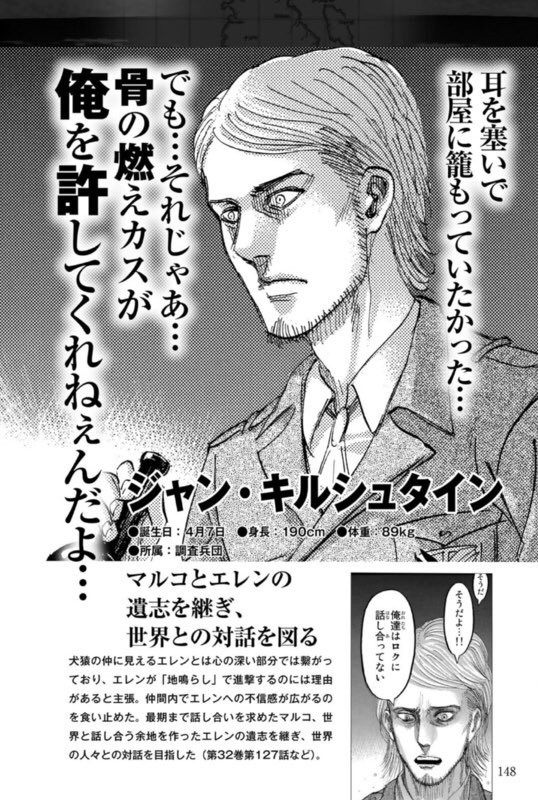
So, it is no suprise that Isayama would have him end up with Mikasa after Eren's death. There really is no one better for Mikasa. Jean is the best option if she can't be with Eren. He cared for her throughout the series, protected her once and he even tried to paint Eren in a better light after the latter offended Mikasa. He is also the only one who can understand her love for Eren and still be with her without getting jealous over the fact that she would never be able to love him as much as she loved Eren. This is something that even Jean's voice actor expressed in the recent Attack on Titan festival that celebrated the 10 years since the beginning of the anime. He felt that Jean got to be with Mikasa and he was comforting her, but he knew that he could never replace Eren in her heart. Yui Ishikawa, Mikasa's voice actress, also said that for Mikasa, no matter how many years pass and how many things she experiences throughout her long lifespan, Eren will always be the number 1 in her heart.
Does that diminish her love for Jean? Does that mean that she never truly loved Eren? No. It simply means that Mikasa fell in love again, 10 years after Eren's death, with a man who is as close to Eren as possible. Jean most likely won her over. She didn't marry him out of some desparate need to be with a man, but because she found the strength in her heart to love someone again, even if it wasn't to the same extent as before. That doesn't make her dirty or impure, like some fans want to believe. This obsession with virginity is frankly stupid. First of all, Mikasa, by the time the she remarries, is, probably not a virgin. Unless she only spent a few minutes with Eren in the world of the paths, the two of them probably did more things than just talking and fishing. Even if she were, virginity is nothing special. Mikasa marrying someone else and having kids with him does not mean Eren got cucked. It doesn't mean that Jean won against Eren Mikasa still loving Eren does not mean that Jean got cucked by a dead man, nor does it mean that he got damaged goods. These points of view are ridiculous and are only expressed by very immature individuals and/or incels. Jean is probably somewhat sad that Mikasa and Eren didn't get to live the life they wanted together and he is probably thankful to Eren for giving him the chance to live his dream life. Jean is not the type to gloat or ridicule his dead comrade, nor the type of guy to be bitter, because Mikasa loved Eren so much.
Mikasa moved forward with her life (not moved on, widows hate this term, because it is closer to forgetting your previous spouse), without ever forgetting her big love or changing her feelings for him. And in the end, after spending many decades with her new family, she passed away peacefully and reunited with her most beloved person in the world in the afterlife. For some, Mikasa reuniting with Eren in the afterlife means that she didn't remarry, because her husband should be her soulmate and if she is with Eren she didn't have a second husband. I disagree here as well. There is no information about how the afterlife works and making assumptions about it based on real world theology is dumb. People can love more than once. If your last spouse is your soulmate, then what happens to people like Grisha? The only thing we can do is go by what is shown and what is shown is that Mikasa both remarried and met Eren in the afterlife.
The same goes for those who believe that Mikasa should not meet Eren in the afterlife, because Eren is a criminal. Attack on Titan does not pass judgement to the actions of its characters that much. Of course, Eren's actions are horrific, but the entirety of the cast and the narrative tries to shift the blame to many more people than just Eren. Eren is not the only one responsible for how things turned out. All the characters sinned. Not to mention, Mikasa expressed her certainty that she would meet Eren again in the end in the final ED song and this is what is shown. Furthermore, after Mikasa's death, the lyrics that play are these "レクイエムレクイエム檜には君た花を
罪を散すなら 暁よ照らせ". This means that if sins are to be forgiven, then dawn will illuminate the flowers under the cypress. Eren's sins by the time Mikasa died have, probably, been forgiven. In any case, repeating my previous words, we can only go by what is shown and what is shown is that the two of them do reunite in the end.
What is the point of the debate?
The debate is probably meaningless. Whether or not Mikasa married does not affect the story in any way. It simply concludes Mikasa's story. Of course, this means that i wrote close to 3 thousand words for nothing, LOL. Nonetheless, i find it ridiculous that large amounts people still debate about the frankly obvious context of 1 panel. This toxic debate should have stopped long ago. What matters is that Mikasa got to live a long and happy life with a person who loved and respected her, just like Eren ultimately wanted and she then reunited with her most beloved. Sure, it hurts that we couldn't see more of Eren and Mikasa as a couple, after being introduced to them from the very first page of the story, but this is no reason to slander other parts of the fandom or the voice actors who did their best to portray these characters for over a decade. Mikasa was lucky enough to be loved so much by two men. She got to spend her time on Earth with one of them and infnity with the other. Despite all of her shortcomings and the bad luck she faced in her life, Mikasa rose stronger from each challenge and earned her happily ever after. This is what's important. In the future, we might get to see more of her family life with Jean and the time she spent with Eren in the paths and her next meeting with him.
#eremika#aot meta#aot theory#eren yeager#mikasa#jean kirstein#jeankasa#armin arlert#attack on titan final chapter#attack on titan final season#shingeki no kyojin analysis#shingeki no kyojin#snk meta#aot#snk#attack on titan#mikasa ackerman#attack fes#yui ishikawa#kisho taniyama
32 notes
·
View notes
Text
Eren and Cinder: Slaves of Freedom
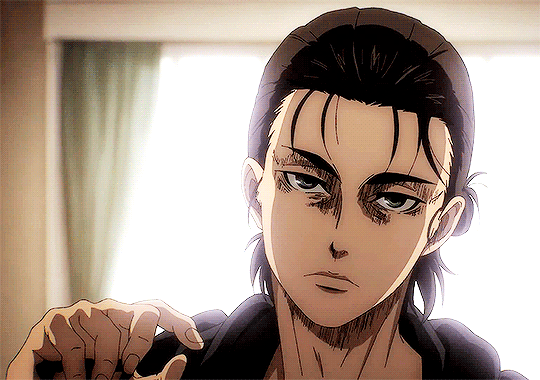
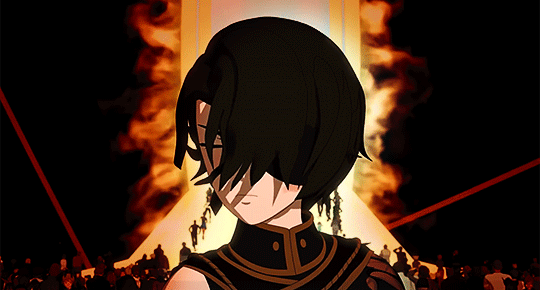
Many people hate Eren and Cinder to the point that they consider them bad characters and it's one thing to dislike a character and another to be badly written and to be fair, Eren and Cinder aren't bad characters. You might dislike them, very much actually, but one thing doesn't take away the other, they're both well written and I'm writing this because I don't want people to think they're bad characters just because they don't like them.
They both share a strong desire for freedom and in this post I'm going to explore their desire for freedom, why they became obsessed with being free as well as other things they share:
Eren and Cinder suffered since they were children due to situations that were beyond their control. Eren witnessed the destruction of his home and the death of his mother Carla as well as being turned into a titan by his father Grisha and later on he would suffer a series of betrayals and find out that everything bad that happened to him was the product of a war that he did not even know existed and Cinder was mistreated on the farm where she was sheltered until Madame adopted her but this mistreatment went from bad to worse, then Rhodes gives her hope of being free as a huntress but she could not bear the abuse and she kills her abusers and then fights Rhodes and kills him.
Both situations are quite different but the effect it caused on both is practically the same: they hate themselves for their impotence and want to be free because they want to have control of their lives, give meaning to all pain they went through and believe that power and violence is the only thing that can give them what they want. Eren and Cinder are victims of a system bigger than them that failed them and they choose to destroy it but at the cost of being left alone in a toxic and self-destructive cycle.
Basically, this is how they want to be seen by others (powerful and untouchable)
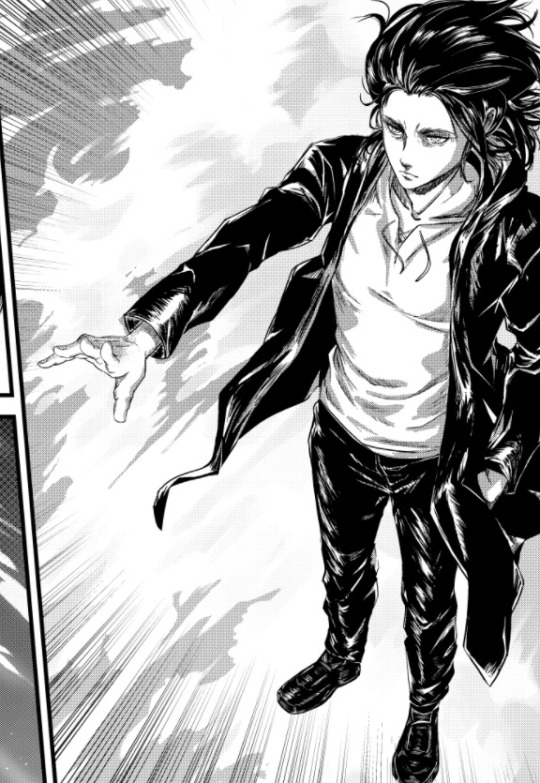

because this is what they really are (pathetic and unsure of themselves)
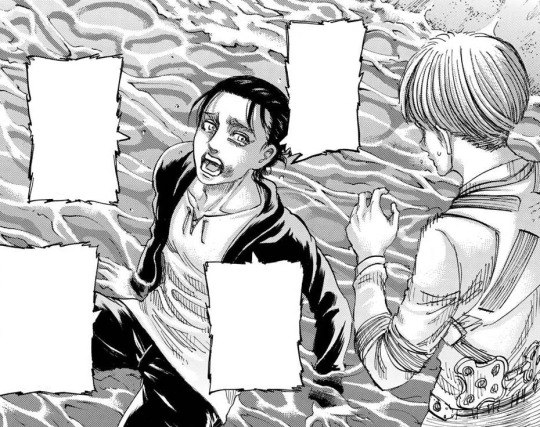

and they know it better than anyone and they hate themselves for it. They're irrational, immature, angry, cowardly in many ways, yet also a frightened children deep down.
Their desire to be free through violence, to have power, and to have a narrative they're in control of has caused them to enter a self-destructive spiral and ironically they become slaves to their desire for freedom to the point that they lose sight of what that they really want (to be loved) and cut off the few positive relationships they have left, taking them away from what they really want.
Cinder only gets close to others for her own benefit and while she projects onto Emerald and Mercury and feels some affection for them, in the end she chooses to abuse and manipulate them and despite Eren genuinely loving his friends but in turn abusing them, he hits them and forces them to do things they don't want to do, Cinder and Eren both share a main flaw when it comes to their relationships and that is that they're afraid of loving other people, afraid of showing vulnerability, they don't trust others because they don't want to be hurt again. Their relationships are selfish love because they are based on how they feel without taking into account the feelings of others. This is so to the point that they also affect people with whom they have no close relationship because they steal agency because they have been deprived of it.
If you notice, Eren and Cinder seek to have a narrative like the trope of the chosen one: one person is a failure and having a series of horrible things happen to them only to realize that they were special for being the chosen one all along but to Eren and Cinder's disgrace they're not chosen but are a deconstruction of this trope.
Eren experienced a series of misfortunes and betrayals, he receives a power that shortens his life expectancy to 13 years and on top of that the whole world wants to destroy his home because of a war that he didn't know existed but wants to believe that he is the chosen one who was destined to activate the Rumbling and that there was no other solution to save his island. On the other hand, Cinder was abused her entire life and felt betrayed by the father figure who inspired her until Salem arrives and grants her the ability to be a Maiden (which is quite a dangerous position since many seek her power either through the power itself, the relics, or both) being left in an abusive situation with her and Cinder chooses to believe that she was meant to be the one chosen to have the Maiden's Powers.
They seek to be special because they hate themselves and they want power because they want control of their lives. They would rather be monsters that everyone fears
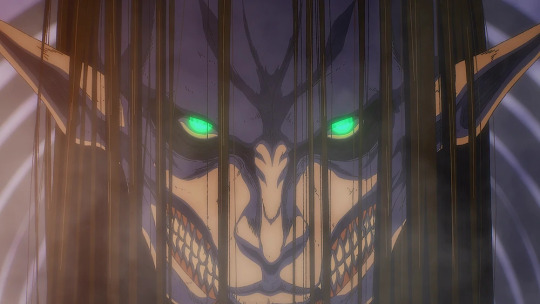
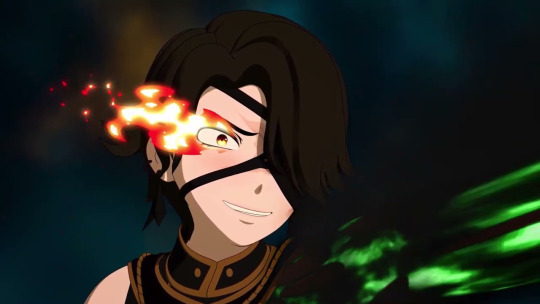
than admit that they're just traumatized and wounded children.
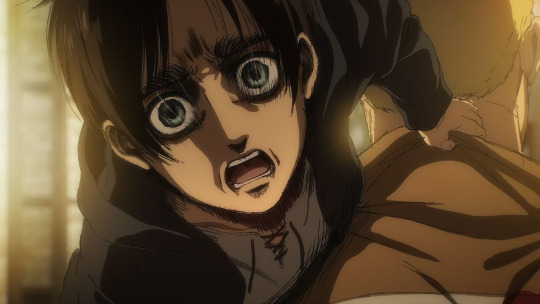
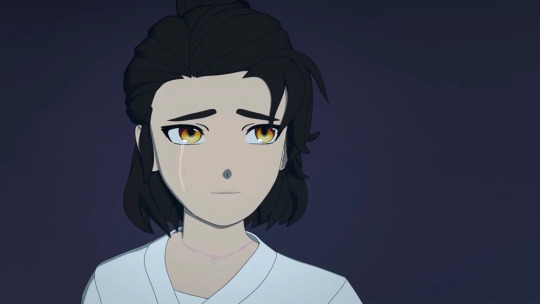
After all, what kind of person wanted to become a monster anyway?
A person pathetically unable to feel good as a human being.
We see that this deconstructed trope, far from being something good and rewarding, is actually dehumanizing. Eren knows that his mother's death was circumstantial but chooses to believe that he caused it and planned it only to feel like he was in control and Cinder chooses to believe that her role as Maiden is her destiny and that she destroyed the kingdom she hated to feel that it was by her own choice when actually everything was planned and decided by Salem.
Eren and Cinder are fascinating because of how contradictory they are, they want to be free but at the same time they want to adjust to a narrative where everything is decided for them. They both think that way because they believe that freedom consists of doing what they want without consequences, but what they don't know about freedom is this:
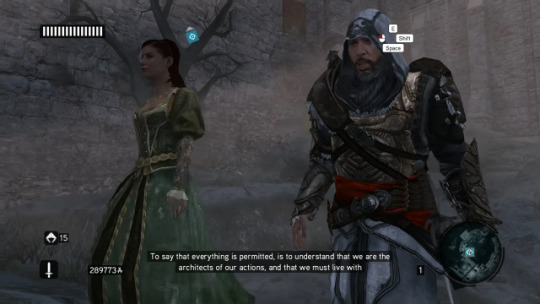

Here Ezio is explaining the meaning of "everything is permitted" from the assassins creed which is basically the meaning of having freedom. Freedom consists of making choices and taking responsibility for the consequences of those choices, but Eren and Cinder don't make their own decisions and when they do they don't want to take responsibility for them. They want the feeling of power and control that comes with choice, but they don't want the responsibility for it.
Eren knows about the world situation regarding Paradis and he wanted to protect his friends and home but deep down he just wanted revenge against the world and the system that hurt him. He didn't want the world to be destroyed but he wanted to be the one to make that choice.
Cinder knows about the situation of the world of Remnant with the classism and discrimination that she and many others suffered and decided to perpetuate the cycle because she wanted revenge against a system that failed her. She doesn't care about the state of the world but she wanted to be important and Cinder, like Eren, is going to make a choice about the world but in turn she has the opportunity to make a different choice than Eren.
In a sense, Eren represents what could happen to Cinder if she doesn't realize her way of thinking that she has to be the chosen one to prove her worth as a person and not acknowledge her pain and the pain she caused others will get her nowhere. She needs to realize that she doesn't need to prove her worth but to acknowledge that she is already valuable and special just by existing, which Eren failed to do. Eren was called to realize it by his friends but he failed because he prioritize his self-loathing and anger against the world while Cinder will be called (possibly by Emerald and Mercury) to realize this and she will listen.
While Eren condemns himself by wanting to continue with his flaw (being afraid to love others, wanting to feel better about himself by hurting others and being special because his childish delusions of grandeur and his inability to let go of his childish feelings of entitlement) and not being able to grow, Cinder will grow as a person and overcome these same flaws. Both are very related to the final destiny of the world, except that Eren ultimately chooses to destroy his while Cinder ultimately will chooses to save it. Eren's choice was selfish and Cinder's will be selfless. Eren chooses to die because he cannot deal with the responsibility of his choice while Cinder will choose to die to save the world and will hold on to her final choice even knowing the consequences of taking it.
Eren died as a slave to his need to seek freedom and to feel better about himself in a chosen narrative but Cinder will die truly free for the first time in her life by recognizing what she really wants (to be loved, make her own choices and hold on to them with all the responsibility that entails).
#snk meta#aot meta#shingeki no kyojin meta#attack on titan meta#rwby meta#snk#shingeki no kyojin#aot#attack on titan#rwby#snk spoilers#shingeki no kyojin spoilers#attack on titan spoilers#aot spoilers#rwby spoilers#snk analysis#shingeki no kyojin analysis#aot analysis#attack on titan analysis#rwby analysis#eren jaeger#eren yeager#cinder fall
57 notes
·
View notes
Text
I think what I like in particular about Armin's added dialogue in the finale is that he takes the blame alongside Eren. Regardless of whether he is actually guilty of the rumbling as well, it's part of Armin's character to want to take the blame for everything
This time, it was to comfort Eren in his final moments. But also, Armin making himself believe he played as much of a role in the rumbling as Eren did will be the motivation that keeps him going to "fix" the world and achieve something as close to possible to peace
It's kind of great, because Armin's "solution" to almost any problem is to give away his life for it. This time, he can't. He must keep living, not only because he promised Eren to live a long life with the others, but because he feels a sense of responsibility to this world
I'm sure this will fuck him up mentally in a number of ways down the line, but it just feels right with Armin's character
486 notes
·
View notes
Text
The dynamic is NOT Eren gets angry, Armin soothes him. It's Eren gets angry and Armin does damage control for him. Eren slips into despair and Armin gives him hope. Armin gets tangled in his own anxieties and hopelessness and Eren comforts him. Eren encourages him, puts his faith in him, gives Armin the confidence to flourish.
It goes both ways. They have such understanding of each other, such kindness and respect the reserve only for each other (& Mikasa of course).

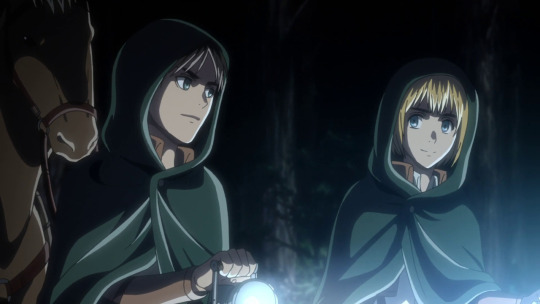

#cl thoughts#it not being reciprocal in fics is a peeve of mine#like Armin is fucked up too#both are mentally ill in similar ways#frustration at their lack of usefulness resulting in a willingness to sacrifice themselves#erearu#eremin#eren jaeger#armin arlert#armin#eren yeager#aot#snk#attack on titan#shingeki no kyojin#eremin analysis#armin analysis#eren analysis#aot screencaps
223 notes
·
View notes
Text
Attack On Titan is a Work of Love
Something I'm always in awe of, is how love is depicted in Attack On Titan. Mostly, because it feels realistic and relatable. Love isn't always the big, over-the-top Romeo and Juliet type.
Love is Eren wrapping a scarf around Mikasa.

Armin regularly going to see Annie.
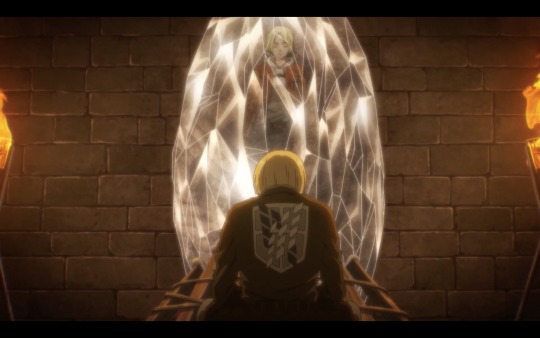
Love is Levi and Hanji knowing each other so well, they’re able to communicate without the need for words.

Historia trusting Ymir so much, that she was the first one she revealed her real name to.

Love isn’t always flowers and big confessions like the ones we see in movies or media. Daily, human love lays in the detail. It’s in consistency, in those little day-to-day gestures a person can have with another. it's in waiting for your partner with a nice meal at home, in sharing a moment of comfort, in understanding eachother by just looking into one another's eyes. it's in protecting and caring and nurturing and motivating.
And it’s why love in Attack On Titan will always feel real. Palpable. Beautifully subtle.
To me, it will always be grounbreaking how, in a world so full of hatred, Isayama managed to create so many unbreakable bonds of the most imperfectly pure love, and how he was able to explore love in all of its different phases and colors.
Love between brothers/family:
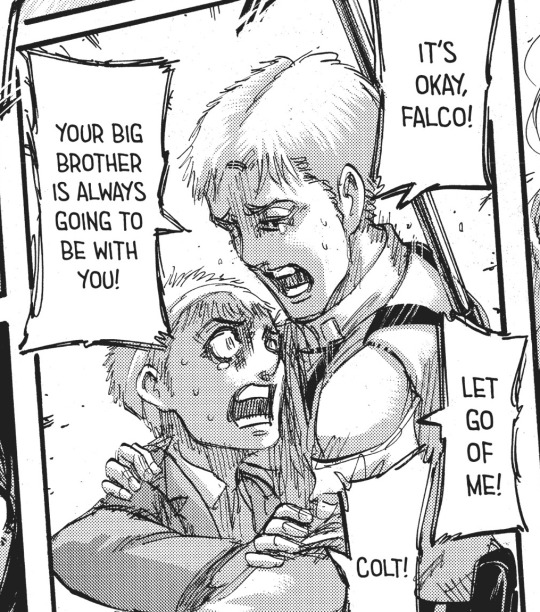
Love between friends:
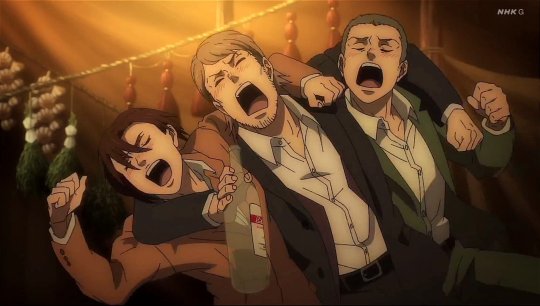
Idolatry (the tpye of love that makes you go blind)
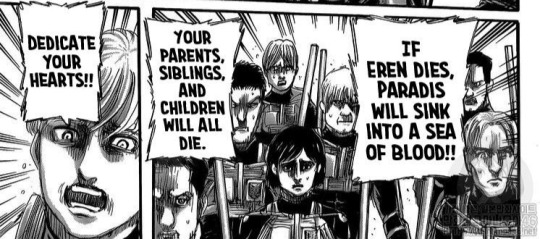
Unrequited love:
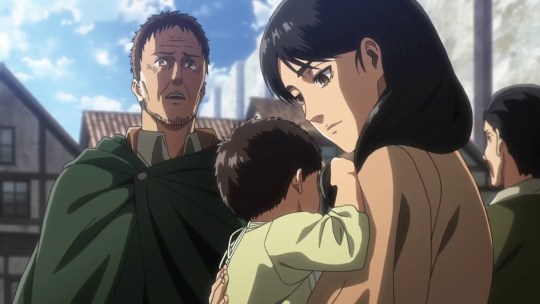
Grief (the loss of someone you loved):
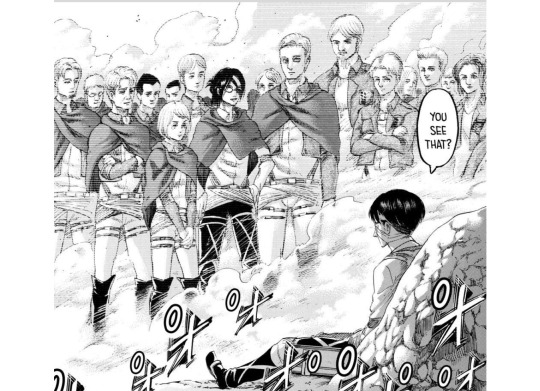
New-found love:
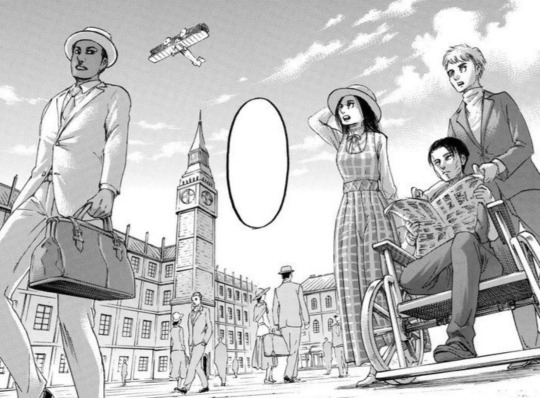
It will always be close to my heart, how Attack On Titan shows love at every corner, in every frame: in words of hope, in helping somebody who struggles, in the will to protect somebody at the highest of costs, in the joking and teasing in affectionate ways. It’s all there, in the small, in what the eye doesn’t always see. It’s always been.
So, even when Attack On Titan can be seen as a work of war and life and death and how the evil parts of the human world work, to me, it will forever be a work I remember for being overflowed with love, too.
#attack on titan#aot#shingeki no kyojin#snk#analysis#manga/anime analysis#anime fandom#manga#eremika#aruani#levihan#yumihisu#erurihan#levi ackerman#hange zoe#eren yaeger#mikasa akerman#104th trainee corps#onyankopon#gabi#falco#falbi#armin arlert#annie leonhart#hajime isayama#love#manga spoilers#anime spoilers#manga panels
2K notes
·
View notes
Text
Why Levi and Petra?
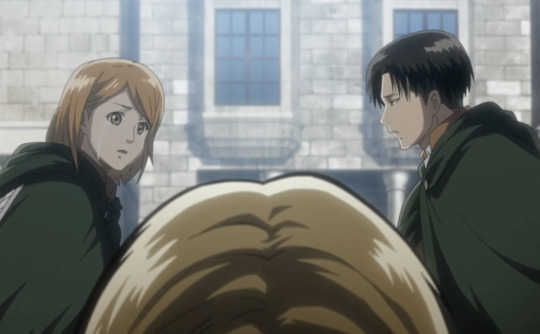
Of course, upon general viewing of SNK and its characters, it's clear that they have established Erwin, Levi, and Hange as the leading trio of the Survey Corps. They represent this faction of the military and in interesting ways, mirror the main protagonists of the series.
While there is a lot to be said and appreciated about Levi's relationships with Erwin and Hange, I have come to find that the character who humanizes him is the lovely (albeit forgettable) Petra Ral.
Early in the series, we are introduced to Levi as Humanity's Strongest Soldier. Erwin makes use of his abilities in this sense, and Hange often relies on his strength in combat as well. That is not to say this is the extent of their relationships: we have Levi's iconic "Give up on your dreams and die" scene with Erwin (S3 E16) and the infamous "Maybe we should just live here [away from my responsibilities] together" request from Hange (S4.2 E8). However, something to note with both scenes is that while they give depth to Levi's relationship with both characters, he essentially serves to highlight others. In the former, Levi's response directly challenges Erwin's dream, and allows this commander a defining moment of growth. Similarly in the latter, Levi is used as a means for Hange to express and eventually overcome their fears and insecurities about the deal they've been dealt as the new Commander of the Survey Corps (which at the time was rapidly disbanding under the Jaegerist movement).
In other words, Levi is the "subplot character" to Erwin's and Hange's individual arcs. (According to John Truby, 'The subplot character… provides another opportunity to define the hero through comparison and advance the plot.')
Which begs the question… at what point in the series, if any, is Levi defined as a character in and of himself?
Two prominent scenes from season 1 come to mind, which are namely: 1) The dying soldier scene (S1 E9), and 2) Petra's conversation with Eren in headquarters (S1 E15).
In the first, Levi comforts a dying soldier and vows to carry on their will and exterminate all Titans. When the soldier passes before he can reply to Levi's words, Levi turns to his fellow soldier Petra and asks her if he was heard. Petra provides confirmation, emphasizing the peaceful expression on the soldier's face.
In the second, Petra confronts a gloomy-looking Eren, who has been tasked to clean headquarters along with the rest of the Special Operations Squad (aka the Levi Squad). She specifically points out how Levi is 'not the hero he's expected to be' in the sense that he has a terrible personality, though she does so while smiling almost fondly, as though it doesn't matter what his personality is because they can always put faith in him as their Captain. It seems she wants Eren to understand this - or a notion similar.
It is in both moments that we are able to clearly see Levi beyond being a powerful soldier. Always, he is a threat. When he enters the scene we expect the shift in the dynamic of the battle - we expect him to win. He's a trump card. Erwin's last words to him are an order (S3 E16), and Hange's last words about him is "he's [Armin's] underling now, so really put him to work" (S4.3.1). Levi acknowledges Erwin's and Hange's humanity, bolsters it even, with the conviction of "dedicating your heart". In SNK he is the symbolism, the embodiment, of a soldier. That's all he really ever gets to be. Even his softest moments with - heck, anyone in the series - are meant to deeply reflect on the guilt, the burden, the purpose of getting the job done. ("So… you're telling me… I've spent all this time and energy running around killing people?" (S2 E12) / "Just think, if your hands were still clean... Jean wouldn't be here right now." (S3 E2) / "If we just run away and keep on hiding, what will we have left?" (S4.2 E8))
But for those singular moments in season one, he's more than just the threat. We see him as a human not only with (personality) flaws, but also with dreams and convictions, tied so seamlessly with his comrades' cause that we are reminded painfully, at the end of the series, that it was Levi who carried them all to the end. Throughout the story we see Levi lament fallen soldiers; we are exposed to how much he empathizes with his comrades and their deaths, to the point where it can be said that no one keeps us more aware of the lives that have been lost throughout the show more than Levi himself.
In this manner, Petra was the subplot character to Levi's hero. She gave the audience a (subconscious) glimpse of the Humanity within "Humanity's Strongest" and built the bridge that would lead us to compelling and important revelations about Levi's thoughts and actions as the show progressed. It's Petra whom he finds tending to a dying soldier; Petra whom he asks for confirmation that the soldier heard; Petra who, against all expectation, asks Eren to see past the station, the status, the soldier, to the person himself.
"He's not quite the great, perfect hero society makes him out to be, huh? The real Captain Levi is shorter than you'd expect, temperamental, crude, and unsociable. (…) You thought that because he's skilled, he doesn’t have to follow the rules like everyone else?" (S1 E15)
It's even Petra who, despite her rank, asks Levi to step aside when Eren becomes a half-baked Titan. Here, Levi's robust intuition and split-second decision making skills are shown even away from the battlefield. It's Petra who leads the Special Operations Squad in their apology to Eren (S1E19 "Bite"), who first instills in us (narratively) the notion of trusting your fellow comrades. More specifically, she is who convinces Eren to place his life in their hands. It's this notion that Levi carries with him even until the final arc - "I've saved Eren countless times over - each time, more comrades dying. All because I believed he was the hope of humanity." (S4.1 E13) In the manga (Ch112), it's Petra we see at the forefront of this belief.

"Do you, Eren? Do you find it that hard to trust us?" It's Petra who dies, her words the final say in convincing Eren: "I believe my squad will be victorious." (S1 E21)
"It's like some awful joke," Levi reflects later on, as his comrades' dying hopes and dreams flash by in the canopy of the forest. "What the hell was the hope that we saw? Such bullshit. It's not even funny." (S4.1 E13) "We" here could definitely mean the soldiers who've given their hearts, but the metaphorical representative of this heart is Petra herself... "Eren! Trust us." (S1 E19)
And in the end, it's Petra in the forefront alongside Erwin and Hange, representative of her fellow soldiers, the one (experienced/veteran) Scout we've seen and interacted with in the entire series to have professed the values of hope, of trust, of belief, which is henceforth carried on by Levi himself, his own convictions, his own dreams. They are, in the entire series, the glimpse we get into the Scout Regiment beyond the series' titular character and his comrades in the 104th, and a thorough dive into what makes Levi Humanity's, not simply its strongest.
Her character song, "The Light of Dual Wings", can literally be taken as an allegory of the dreams the Scouts have entrusted to Levi. That's how prominent she is as a Scout; how coded her devotion to Levi is, whether interpreted platonically, romantically, or narratively, as the dedication of hearts.
So, yes, I love them together. I love their scenes, the implications of them narratively, the values Petra professes so effortlessly in the air, washed away by the higher tides of the Female Titan arc. I love that it's still Petra at the forefront, in all of Levi's reflections moving forward, because she is our first glimpse into Levi's character, the real him.
In the end this is just a ship post struggling to keep from delving too much into the symbolism of Levi and the Scouts (how Levi is the face of the Scouts more so than Erwin himself, really), the truest depiction of humanity's collective fight for freedom in this entire series. In his early days, Eren wanted to be a Scout, after all. It is Levi and Petra who push him forward into 'that hell' - for better and worse, respectively.
#levi ackerman#petra ral#rivetra#levi x petra#levipet#aot#snk#attack on titan#shingeki no kyojin#levi character analysis#levi petra relationship analysis#aot analysis#snk analysis#i even cited episode numbers!#i was too lazy to get the overall episode number though xd#so you get dumb citations like S4.3.1 lol#analysis.vtf
243 notes
·
View notes
Text
Can we talk for a second about how Levi always refers to the members of his squad by their first name. In Japan, referring to someone by their first name is significant. Its more typical to refer to someone by their family name if you don't know them all to well. Close friends even still use honorifics, such as [Name]-chan. There's several instances where Erwin refers to the newer cadets by just their last names, which is typical in a military setting even in other countries, but Levi calls the 104th kids by their names, Armin, Jean, etc.
Levi obviously doesn't care for honorifics or typical social niceties -they didn't really matter where he grew up anyways- but to me him referring to them by their first names -even as they call him Captain (heichou)- means 'we are equals, I trust you'
375 notes
·
View notes
Text
Although everyone is talking about Armin and Eren's dialogue (which was amazing), for me the heartbreaking moment was that of the civilian refugees being cornered between the cliff and the advancing titans and the man lifting the baby to pass it back, in a desperate gesture to save him.
A father assuming, in the midst of terror, that he was going to die, but wanting to save his son, because it was better for his son to be an orphan and have a chance to live than to die in that terror.
And that moment is heartbreaking because it is full of realism. Because we still see it today on live broadcasts in the news: adults doing everything they can to protect and save their children in the midst of terror, hoping that it will end and they can live. Because there is nothing more horrible than the death of a person who could not experience life.
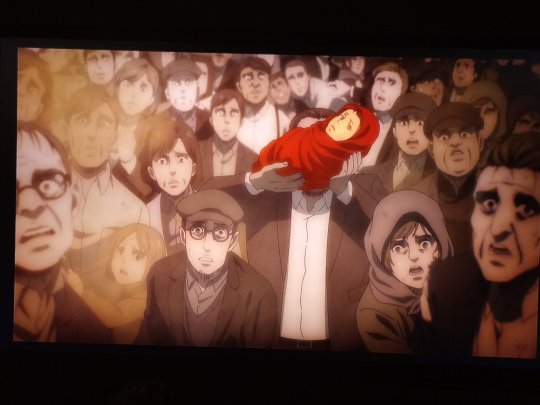
#attack on titan#shingeki no kyojin#snk#aot#schindler's list#media analysis#eren yeager#armin arlert#mikasa ackerman#levi ackerman#levi aot
255 notes
·
View notes
Text
The Psychological and Emotional Impact of Levi’s Early Childhood:
I don’t think Levi’s early childhood really gets discussed enough in the fandom, or the ways in which those experiences in his formative years had to have impacted him. This could be because we don’t really get many panels depicting his childhood. Just a few. But those few panels show us enough for us to extrapolate plenty and form a pretty clear picture of what he went through.
First of all, it’s almost a certainty that Levi was born as the result of rape.
That’s something that I think everyone should let sink in.
He was born in the brothel that his mother, Kuchel, worked in. And “worked” is a relative term here. Kuchel was driven into the Underground as a result of persecution by the royal family. She was undoubtedly very young, she was alone, with no real resources or support or guarantee of safety or protection from anyone, in an environment of criminality and violence. There were likely very few, if any options available to her in terms of her own survival. Her becoming a prostitute wouldn’t have been any kind of a choice then, but rather a move made in desperation. And so I think we can also safely assume that Kuchel’s experiences working as a prostitute were tantamount to forced labor. In other words, a kind of slavery. She was almost certainly paid a paltry sum by the brothels owner, evidenced by the sorry, squalid and destitute state we see her and Levi living in when Kenny comes. She was likely afforded very few, if any rights or defenses against whatever her clients chose to do to her, as also evidenced by the fact that no one seemed to really know or care enough about her or Levi to even realize when she had died.
It’s impossible for me to define any of what Kuchel went through working in such a place as anything less than rape, then.
So, Levi’s very existence is one that is a literal product of violence. I’m absolutely sure that Levi himself is painfully aware of this, knowing that he was born out of his own mother’s pain and suffering. Going into the implications of this on Levi’s psychological health, I think you can safely assume this realization had a very negative impact on his own sense of self-worth. His mother was the only person in his childhood who we ever saw treat him with any kind of actual love or kindness. The only person who ever, actually wanted him. And yet, Levi would have seen demonstrated to him, every day, how his existence in his mothers life placed an increased burden on her, forcing her into increasingly more desperate circumstances, now having to feed two mouths instead of only one, and as a result, likely having to engage in increased, unwanted sexual activity with her clients. So Levi would be aware that not only was his mother, (again, the only person who loved and treated him with tenderness) being hurt on his behalf, but he also would have been aware, after witnessing the particular ways in which she was being hurt, that he himself was the result of that violence. Levi would have been shown that his very existence, then, was something which caused immense suffering and pain to the only person in his life who loved him. I honestly can’t even imagine the negative implications of something like this on a young mind. Only to say, it must have been horrific and resulted in lifelong trauma. Trauma which, due to the desperation of Levi’s life afterward, he likely never had any opportunity or chance to even address.
Now, moving on to something else. There’s a tendency by many to paint Kuchel as this sort of perfect mother figure. Someone who, through the power of her love for Levi alone, was able to overcome the trauma of their general circumstances, to negate the negative experiences he would have been exposed to, resulting in Levi becoming the kind and compassionate person he would be as an adult. But I think this assumption about Kuchel and their situation is not only unrealistic and idealized in the extreme, but also in its way, undermines the actual bleakness of their circumstances.
Again, we have to remember that Kuchel was driven into the Underground, and essentially forced, through lack of any other options, to become a prostitute. Calling her a prostitute is a nice way of saying she had to sell herself into sexual slavery. Kuchel’s own psychological and emotional trauma doesn’t often get touched upon or acknowledged when people talk about her and her relationship with her son, nor does the desperate poverty of their living situation. Kuchel died right in front of Levi, and we can assume with pretty good accuracy that she either died from a sexually transmitted disease, or that she died from malnutrition and starvation. These weren’t two people, then, who were living a comfortable or secure life. In fact, the very opposite. Levi was starving to death when Kenny found him. It’s easy enough to assume from his state of general neglect and starvation that Kuchel, at the very least, was struggling to provide for him. Not just food, but any kind of comfort or care. Clothing, warmth, protection, cleanliness, and very likely even, affection. This isn’t a knock on Kuchel’s worth as a mother, or her parenting. She was, undoubtedly, doing the best she could given the circumstances. But, again, this particular aspect of their lives isn’t touched on nearly enough. Kuchel died out of neglect, impoverishment, desperation and abuse. Given what we can assume her day to day life was like, having to let men come and sexually assault her just to keep herself and her son alive, one has to also consider the emotional and mental toll this sort of existence would eventually have on her. She had to have been exhausted, both mentally and physically. You add to this the always uncertain and present reality of whether either her or Levi would even be able to eat on any, given day, whether she would be able to keep her son from starving to death, and you can start to form a clear idea of how things like “playtime” or “fun”, or freely given and enthusiastic love and affection, would be, tragically, low on the list of priorities. Their situation was absolutely a situation of survival, first and foremost. Luxuries weren’t a part of their lives. Anyone who’s ever experienced extreme deprivation, poverty and desperation on the level in which Kuchel and Levi were living would know that those material realities absolutely have a negative impact on one’s ability to simply live. To be happy. To indulge in fantasy. To indulge in luxury. To indulge in any kind of relaxation or ease of living. It’s nice to imagine that Kuchel was always able to show Levi love and affection. To always be a kind, caring and generous mother to him. But that perception of their lives together ignores the bleak and harsh reality of what was really going on. More likely than not, Kuchel was often too exhausted and in bad, physical shape herself to play with Levi, to pay attention to Levi, to indulge in Levi. It was everything she could do, after all, to simply keep Levi alive, let alone healthy and happy. Kenny described Levi, when he first took him in, as the most unfriendly kid he’d ever met. We rarely see Levi speak at all in those early days with Kenny. That doesn’t speak to someone who is well adjusted socially. That doesn’t speak to someone who received a lot of open love and affection in the formative years of his childhood. Again, this isn’t to criticize or undermine Kuchel’s abilities as a mother. It’s simply acknowledging the tragic reality, that someone in Kuchel’s position, living the kind of life she was living, wouldn’t have had the luxury of being for Levi everything he needed her to be.
This also leads me into another point I don’t think I’ve ever seen discussed, and that has to do with Kuchel’s decision to have Levi at all, and how that choice is, simultaneously, both entirely selfless, and entirely selfish.
Kenny tells his grandfather that he tried to talk Kuchel out of having her baby, trying to explain to her how bringing a baby into the kind of situation she was living in wasn’t viable. It was only going to make, not only her own life worse, but in turn, the baby’s life was going to be awful too. We later see, in Kenny’s memories, a scene in which Kuchel is holding Levi as a newborn against her chest and crying tears of happiness. Kenny recalls this as part of his monologue about dreams, and the desperation of dreams, and the ability of dreams to corrupt us. This is important to acknowledge. Because again, while Kuchel’s intentions in giving birth to Levi were pure, and her love for him was absolutely pure and genuine, still, she DID bring him into a situation of extreme poverty, desperation and violence. In a way, Kuchel prioritized her dream of motherhood not only over her own well being (this being the selfless aspect of her decision), but also over Levi’s well being (this being the selfish aspect). She knew her own living situation was terrible, filled with suffering, cruelty and pain. She knew this, and she was aware, from Kenny’s own words, that bringing a child into that situation was only going to make things worse, for both of them. But she chose to do it anyway. She chose to give birth to Levi, and to keep him, knowing the sort of deprivation and desperation he would be exposed to. Knowing the kind of violence and cruelty and ugliness he would be exposed to, being born and raised in a brothel, in which she was working as a prostitute, relegated to a single room with him in it.
Chances are high, extremely high, that Levi saw his mother raped. Maybe she sent him out of the room when she was with clients. But maybe she wasn’t able to. We never see any evidence of Levi having ever left their single room as a child, and even if he had, the building they were in was a brothel, catering to men seeking and paying for the sexual services of women. It isn’t an environment that is, in any way, suited to a child, friendly to a child, or even tolerant of a child. It’s almost 100% certain that Levi was, at one time or another, exposed to sexual violence against women, whether it was his own mother, or someone else. He would have been exposed to violence in general too, because men who sexually assault women are also very likely to physically assault them. I don’t think it’s any kind of a stretch, even, to assume that Levi himself might have been on the receiving end of physical violence, at the least, in a place like that. Men who wouldn’t want some little kid around while they force themselves on the women there probably would have little qualm with hitting Levi to make him go away.
Again, going back to Levi’s “unfriendliness” when Kenny first takes him in, I think we can extrapolate that a lot of what Kenny was perceiving as unfriendly behavior was in fact just Levi being withdrawn. He seemed sullen and mute to Kenny. We see this in children who have been abused. They tend to go within themselves and make themselves as unobtrusive as possible, not wanting to draw attention to themselves, because whenever they have, it’s always resulted in them somehow being hurt. Levi’s body language when Kenny first meets him speaks to this as well. He’s curled against the wall opposite his mother’s bed, literally making himself as small as possible, his knees hugged to his chest, his head bowed close to them, etc... Like he’s trying to hide. Again, it doesn’t take a stretch of the imagination to assume that Levi fell victim to the violence of the men who frequented that place. The Underground in general was filled with violent and cruel men who made a living out of criminality, who in fact wouldn’t think twice about committing murder, etc...
This is the world Kuchel brought Levi into. A world of physical and sexual violence, a world of depravity and illness, a world of poverty and starvation. Kuchel loved Levi with all her heart. That isn’t for a moment in doubt. But by choosing to have him and keep him, she also trapped him into a life of pain and suffering of his own.
Kuchel had to know, if anything were to happen to her, that Levi’s chances of survival were next to none. He was helpless without her, and that too is evidenced by the fact that, when Kenny finds them, Levi is literally starving to death. He’s just sitting there, resigned to his fate. There’s no indication whatsoever that Levi ever even left their room to seek food, or help of any kind. He just sat there, trapped with his mother’s rotting corpse, waiting to die. And nobody there cared enough to even check on him or his mother in the span of time between when she fell ill and when she died. Nobody there cared enough about either of their lives to see if they were okay, and we can assume, because Levi didn’t seek anyone’s help, that he didn’t think anyone would help him, which tells us all we need to know about how he and his mother were generally treated in that place. Kuchel must have known, as she was dying, that without her, Levi was going to die too. She had no way and no cause to know or think that Kenny would come by to rescue him. And, indeed, if Kenny hadn’t shown up right when he did, Levi almost certainly would have died in that room with her. I can’t even imagine the pain this must have caused her, knowing she was dying, and knowing as a result, that her son was going to die too. It would have been unbearable. But again, this is also the risk Kuchel took when she chose to give birth to and keep Levi. She knew this was a possibility. That her child would die a slow and painful death without her there to protect and take care of him.
So this sort of sunny, idealistic picture that tends to get painted of Levi’s life with his mother seems both unrealistic and unfair to them in terms of understanding their actual situation. This wasn’t a happy or good life they were living together. It was a life full of misery and pain. Levi’s monologue later on to the 104th recruits, about not knowing if you’ll wake up and get to eat that day, or if your friends will still be alive, wasn’t just a reflection on their lives living with the threat of titans. It was a reflection of his own life living in the Underground, living a life surrounded by poverty and violence and uncertainty. That was Levi’s existence for the first 25 years of his life. That was Levi’s childhood. Violence and starvation, cruelty and deprivation. Kuchel’s love, as pure and as genuine as it was, wasn’t enough on it’s own to overcome the scars of all that.
One last note to end this on.
There’s also a tendency to paint Kenny’s rescue of Levi as this very heroic and selfless act on Kenny’s part. A moment in which Levi was pulled from the jaws of certain death and given a chance to live by his uncle. And while, yes, Kenny certainly did save Levi’s life and give him that chance, I think it’s also important to acknowledge that Kenny’s treatment of Levi was abusive, and ultimately caused him more harm than good. Kenny, we have to remember, went down to the Underground to rescue Kuchel. He went to that brothel with the intention of pulling her out and bringing her to live back up on the surface, able to do so now that he had ended the persecution of their family through his connection with Uri Reiss. But by the time he got there, Kuchel was dead, and she’d left behind her only child in Levi. Kenny could have so easily brought Levi up to the surface with him, the way he’d been planning on doing with Kuchel, and given him a good and happy life. He could have saved him from the hell of living in the Underground City. A world of perpetual darkness, a world of constant danger and desperation and illness. People talk about how Kenny gave Levi the tools to survive in such a harsh environment, and treat this as if it’s something to somehow be applauded and praised. But Kenny shouldn’t have had to teach Levi to survive in a cut-throat environment at all. He’d made it possible for those with the Ackerman name to live free of persecution up above. He could have easily taken Levi with him and given him a good, traditional education, fed and clothed him, given him shelter, given him the chance to grow up in fresh air and sunlight, given him a chance to make friends with other children, to learn social skills and just live a normal existence with the opportunity to actually be happy. But instead Kenny chose to keep Levi in the Underground, to teach him how to kill, to teach him to be violent, and not much else, before simply abandoning him there and never going back, forcing Levi to survive on his own in the most dangerous place inside the walls. What Kenny did to Levi wasn’t a kindness. A kindness would have been rescuing Levi from the Underground entirely and giving him a real life above. A kindness would have been Kenny giving to Levi what he’d planned on giving to his sister. But Kenny was too selfish to do that, and that’s the bottom line. He didn’t want to have to take care of and raise a child. He didn’t want the responsibility. Whether that’s tied to Kenny’s own, negative perception of himself or not doesn’t matter. He still chose not to take Levi with him and give him a real life because actually caring for and raising a child would have been too hard, too much work, too much responsibility. By leaving Levi there in the Underground, he sent Levi the message, clear as day, that he wasn’t wanted. And so Levi spent the entirety of his childhood, and a good portion of his adulthood, believing that, and living in the Underground, living a life of violence and desperation and suffering.
I don’t think the suffering Levi went through as a child gets discussed or acknowledged enough, or examined enough. I don’t think people often look at it with enough objective realism to realize the extreme harm and trauma Levi experienced and was left with. It’s genuinely a miracle that Levi turned out the way he did. That Levi is as good a man as he is. Nothing in his life growing up can really account for that. Everything in his life growing up would evince that he should have become the sort of man Kenny was, selfish and cruel. It’s truly against all odds that Levi became the exact opposite. Selfless in the extreme, kind, caring and compassionate above and beyond anyone else in the series. Someone who fights for and gives his life in dedication to the dreams and lives of others.
In many ways, Levi is, himself, the greatest miracle of all.
766 notes
·
View notes
Text
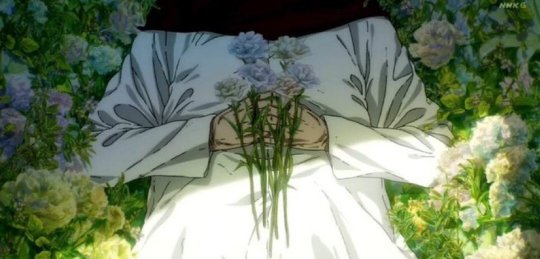
Was she buried under the tree alongside the love of her life? Please. 😭 💔
I remember this scene being shown in the manga, but she was amongst the white roses. Glad they decided to change it like that. 💔
#attack on titan mikasa#mikasa#eren x mikasa#eremika#mikasa ackerman#shingeki no kyoujin#snk#snk final season#shingeki#shingeki no kyojin#thank you isayama#attack on titan#attack on titan the final season#aot#aot analysis#aot anime#aot angst#under the tree
241 notes
·
View notes
Text
Hats off to Jean Kirstein, the Scouts' unlikeliest hero.
Honor dictates that I say a few words to honor the birthday of one of the 104th's strongest and most naturally gifted soldiers.

Jean Kirstein is a character who, at one point, I would have said had one of the most impressive arcs of any individual character in Attack on Titan. Once content to keep himself to the sidelines in service of the royal government, Jean has really come a long way from when we first met him in the early days of season one.
Jean has always been abrasive and cynical, holding on to no fantasies about the miserable world he and his friends have long been trapped in. But in spite of all he's gone through, he's shown a keen sense of judgement and natural leadership that has allowed him to survive again and again in a situation he at one point would have been all to happy to look the other way, and never turn back. In a world where insanity dominates between the Titans and humanity, Jean always seems to know what to do even when he's at an utter loss of what the outcome could be, and he's so often been a voice of reason when faced with the panic of his comrades or the zeal of his friendly rival turned mortal enemy, Eren.
His old pal Marco recognized this potential in Jean, and it seems Marco's words have resonated strongly with Jean long after his own demise. Understanding what was at stake, he took a hard look at what he signed himself on to and charged at it head on. Through and through, he's proven a dependable ally to those serving by his side and ultimately, under his own command. One of Jean's greatest assets, and perhaps in his own mind his greatest curse, is his nobility. Whatever his faults and failings, Jean has always sided with the greater good, and is one of the most incorruptible characters on Paradis. He's been pushed to his limits every bit as much as the rest of his circle......And through it all still stands tall.
By no means flawless, and I actually have some far stronger opinions about Jean in spite of the fact that I rarely ever comment on him around here.......And that's a discussion for another day.
For tonight though, gotta acknowledge the impressive track record of a guy who probably never should have been a Scout in the first place.......And somehow has lived to speak of the experience after going through Hell and back time and time again.
Seriously, Jean Kirstein would have been a worthy contender to become Commander of the Scout Regiment, or second-in-command under Hange and/or Levi. Whatever the case, he's certainly been an asset to the greater cause of freedom, and perhaps understood the meaning of what that was far better than Eren himself EVER did.
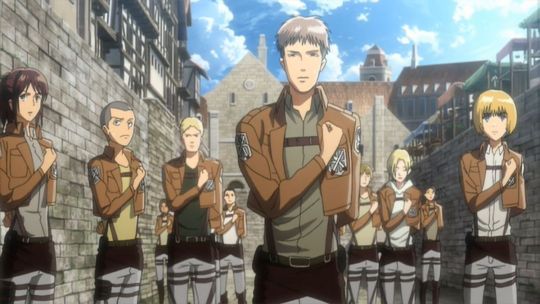
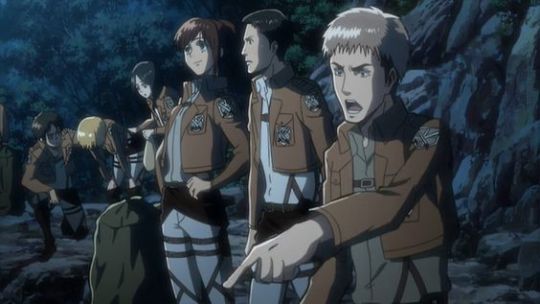
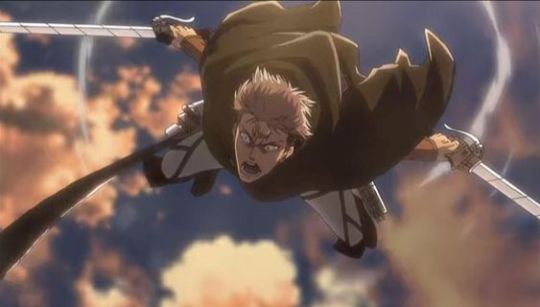
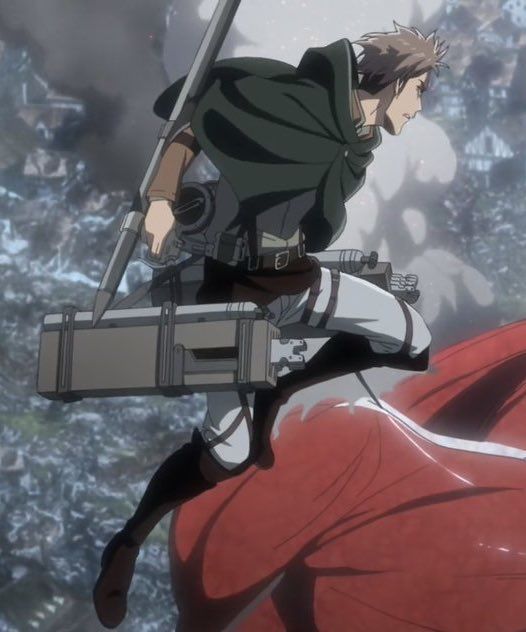



Keep moving forward as you always have, Commander Jean.
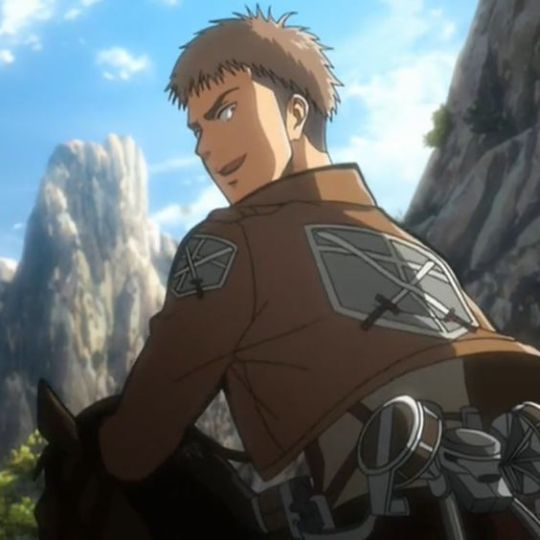
Happy Birthday to a man worthy of wearing the Wings of Freedom.
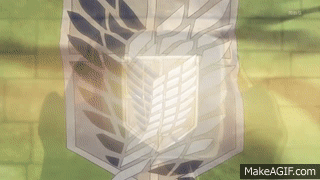
------------------------------------------------------------------------------
Oh, and one last thing; If you really do truly love Jean, then for the love of all that is good and just.........
Do NOT even think about it with the lame as hell Horseface jokes. I think the fact that I acknowledged not just Jeanmarco, but also "Jeankasa" up here is being pretty generous as it is. So please, don't push it, alright?
Besides, I can name five other characters who look more like horses than him.....
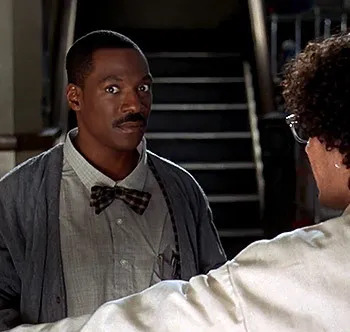
#jean kirschtien#jean kirstein#jeanmarco#jeankasa#attack on titan#shingeki no kyoujin#aot jean#snk jean#snk anime#aot anime#snk manga#aot manga#snk fandom#aot fandom#shingeki no kyojin#eren yeager#mikasa ackerman#hajime isayama#armin arlert#snk spoilers#levi ackerman#scout regiment#survey corps#snk hange#hange#hange zoë#hange zoe#snk analysis#character analysis#armin attack on titan
84 notes
·
View notes
Text
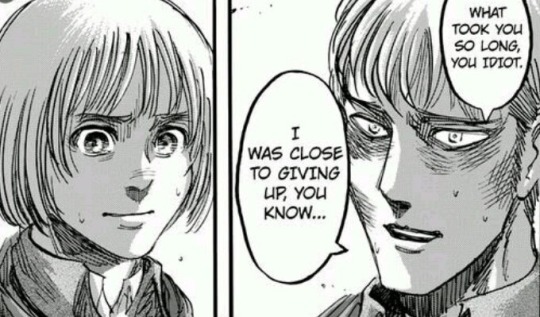
Sometimes I think about how Armin was originally part of Jean’s character in the early versions and I wonder how different things would have been if they hadn’t been separated… Armin is such an important character. The story depends on him heavily.
Looking at them now, I think it’s no coincidence that these characters have such an impact on the growth and survival of the other.
That Jean pushes Armin through his fear of making hard decisions in the heat of the moment.
That Armin saves Jean by confronting this fear and committing to his choices.
Armin has always been determined to stand up to others, so not to be seen as weak, but the fight with himself is what challenges him the most. I think it’s kind of cool that Jean, the character he was born from, gives him strength to tap into his own power. It feels symbolic.
I could go on and on about these two, but maybe another day…
#attack on titan#shingeki no kyojin#aot analysis#armin arlert#jean kirstein#jearmin#armin analysis#Jean analysis
71 notes
·
View notes
Text
I wanted to talk about this scene for a while now:



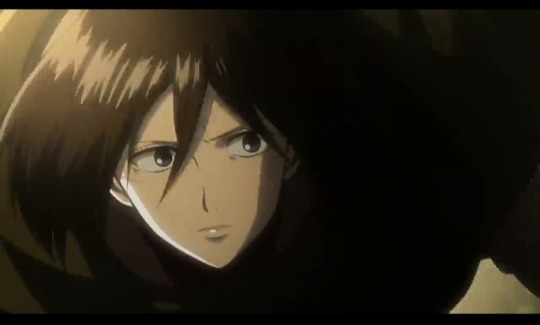
First of all, when Mikasa obviously very upset and raged up by female titan kidnapping Eren, she vents her anger out by blaming Levi for not being able to do his job of protecting Eren. I don't think she knows much about how the whole squad got killed by Annie.
But, Levi instead of snapping at Mikasa or getting offended by her furious statement, he chooses to not react on it. He just saw his squad dead and is definitely depressed.
The look on his face after Mikasa said that, turns grim and he looks too tired. He looks like that while returning from expedition and facing Petra's dad too. I think, the statement actually hit him more than it shows. It looks like he ignored it, but the grim look said otherwise.
He was definitely blaming himself for not reaching out there in time to save his precious squad members and was already suffering from their loss of lives. And Mikasa's statement worked like lemon on wound.
He didn't react, it's not like him. He also is a very understanding adult, for he chooses to not think Mikasa as rude for saying that. He understands she is just 15 and how Eren is a special person for her, having him taken away and endangered always make Mikasa recklessly furious. But also, I think, he thought that those words were true, he thought that it was his shortcoming for not reaching there on time.
He understands that he can't save everyone, but it's this sad realization for him that pains him the most. Being called humanity's strongest and then not being able to wondrously saving them. He sure lost and sacrificed the most, considering his closest people and friends are all dead.
He is too selfless and goal oriented ( saving and protecting humanity) that he won't wallow in self pity and he never did strike me as someone who would ponder over things he couldn't control, he did rather do something productive and make a difference. But this feeling of not being or doing enough definitely always there somewhere in his mind, he just brushes it off and focuses on what he can still do.
He lost his whole squad too, but he chooses to put aside his pain and understand Mikasa's. He was never the one to complain about his life either. He is just to selfless to do so.
This scene was a really good point for his character, how he is an understanding and thoughtful adult. How he does get affected by deaths severely and doesn't show it. How he might actually blame himself for not being able to save lives.
I don't think Levi would have too much guilt, in a way Erwin did. But he definitely sometimes blame himself for what's lost, that is not even his fault. And just shows how even a person who has been through and seen so much deaths and suffering, can still be so vulnerable to it.
Levi has treated every life as precious and meaningful, loss of this life he considers so precious and not being able to do anything, when situation is totally our of his hand, can make him depressed too. As I already said, he would still brush off those thoughts and not ponder on it. He would rather do whatever he can to help, to make sure that those lost lives weren't in vain.
For Levi not only life has meaning and worth but death does too, he will do everything in his power to give meaning to both the lives and deaths of his comrades.
#levi ackerman#attack on titan#aot#levi aot#levi attack on titan#levi#shingeki no kyojin#levi fanart#levi character analysis#kikarou rambles#aot meta#kikarou metas
136 notes
·
View notes
Text
Armin is basically your guide to leaving the forest. He is what Humanity needs to retain its Humanity.
Armin is hated on so much after S4 for being "useless" and "not living up to Erwin" but people forget, Erwin was so good because he had YEARS of experience. When Erwin died, he was what, 40-ish? At 15-19, Erwin was much the same as any ordinary cadet, you can see in the flashbacks in S3 Part2, a very young Erwin crying with a wounded/dead soldier and trying to fend off a Titan.
Armin is the embodiment of what the survey corps stands for - "Understanding". He is a pacifist and optimist but not naive, he knows that he has to kill when push comes to shove. He doesn't like violence but agrees that it is necessary sometimes. There is nothing wrong with that. He's a very relatable character. Don't forget that Erwin recognised his potential. He literally looked shocked when Armin theorised Reiner to be hiding inside the walls in RTS arc. Armin is the first character in the whole show to internalize his enemies thoughts and actions and try to understand it from their pov. He always tries to talk first and when that doesn't work, he pulls the trigger. You can tell me "his talking doesn't work!" but that doesn't mean you don't try. He's convinced and manipulated people plenty of times. If your only option is always to kill first before anything else, then you're not in your right mind.
A character is not weak simply for wanting peace. Armin doesn't run from his conflicts, he always faces them head on whether he likes it or not. His yearning to choose the method with the least bloodshed is actually admirable - it's easier to just pull the trigger in a world like SnK where people hate you, no? Why go through all the effort of trying to make people understand? He's a very strong character because he stands by his convictions.
It's unfair to burden him with Erwin's legacy at this age. He's also selfless to a fault. While Erwin did care for his soldiers, he never hesitated to use them as bait. Armin lacks that trait - being ruthless. Instead he has shown time and time again that he'd rather sacrifice himself so others can go unharmed. Despite the lack of experience, he still came up with some of the best plans, strategies and deductions in the show, some of them conjured up within seconds, and all that when he was even younger than he is now. Reiner was sweating and shitting his pants when Armin figured out the Female Titan's intentions in under 30 sec. At 15, Armin secured the collosal Titan for the scouts with just 1 casualty - himself. Just a few examples. He lacks Erwin's experience and deals with a severe lack of confidence, but for his age, possesses a lethal brain and outstanding intellect.
One of his most forgotten contributions is during the Scouts vs Kenny's squad. It was his analysis of the anti-personnel ODM gear, and following strategy, that allowed the scouts to exploit the weaknesses of their opponents' weapons. They wouldn't have won those fights with such success otherwise. He's extremely perceptive. Notice that when he fucked with Bert's mind back in S2, it was bec apart from Reiner (who knew from long ago), only he had noticed Bertie boi had a thing for Annie. He pays attention to his surroundings. He picks up on every little detail. He knows where to hit where it hurts. His 'Annie' strategy with Bert in S3P2 fails because he didn't realize Bert was a different person, someone who had stopped Annie from being his weakness. That was a crucial lesson Armin had to learn, but he learned it. He's very good with his words. People don't want him to open his mouth and change their minds (eg, Connie with Falco, Daz & Samuel). He's a genius strategist and war tactician in the making, give him a few years and see what he becomes.
One of my most favourite moments is during the table scene with Eren before getting beaten up, the only psychological attack Eren fired at Armin ("You're only visiting Annie cuz of Bert"), did not sting Armin at all, it only shocked him that Eren would try to bullshit him into that false logic when clearly Armin knew better. So Eren chose to beat him up, but Armin still had the final word. "You're the slave Eren" absolutely got under Eren's skin.
He isn't dumbed down post S4, it's just that the stakes are infinitely higher.
There's a lot of blame on him for "not doing anything in those 4 years despite having a genius brain" etc etc. Armin wasn't commander. They were dealing with a hostile world which they were desperately trying to understand for the first time in a 100-year history of being isolated inside the walls. It is one thing to understand people inside the walls and fuck them up (like Erwin did multiple times) but another entirely to deal with several countries in a world you discovered overnight. Politics and diplomacy is hard af. I doubt Armin would have been able come up with some 20/20 vision plan at that point to end the whole conflict anyway. Pixis didnt. Hange also didn't. Nobody did! The island had other intelligent people too!
Regarding Erwin, the whole point of his death was to show that he was put to rest from his suffering. It is the end of Erwin's story.
I dare say that if Armin had become Erwin 2.0, the haters would have said "Oh, he's just a copy of Erwin, he's not his own person!" So, conclusion: he's not supposed to be Erwin. He's his own person with his own methods and he's 19, leave him alone and please compare people with comparable experience.
Dude also went through a ton of issues as a young kid and has a severe inferiority complex, guilt at being revived instead of Erwin and the constant pressure of living in Erwin's shadow. Add to that his best friend of 19 years disappears, forces him to nuke a port and kill people against his desires, then pushes him away, doesn't explain shit, snaps and goes on a mass murder spree - you have a guy under extreme duress and he's still thinking of the big picture on Paradis, that genocide is wrong even though it's his best friend doing it. He has already subconsciously realised that they cannot stop Eren without joining hands with the same enemies they tried to kill a while ago. So despite having a mental breakdown, he still goes to get Falco back, because as a person, he values humanity and understanding above everything and can't watch another one of his comrades lose his shit and feed a lil kid to a Titan.
I also believe that Armin knew Falco was a decent kid, considering what he was taught in Marley, and choosing to save him was symbolic in that Armin wants to save the one kid who sees through the fucked up hate. In this moment he was the closest he'd ever been to Erwin (since Erwin's death) with that calculated risk, but also very true to being *himself* , very Armin, because he jumped to his death, aka, selfless. Rescuing Falco was a v good call, not only because the kid is a shifter and therefore necessary to form the alliance, but also cuz if you are a manga reader, well, you know why. He slapped sense into Connie, rescued Falco, showed a young Gabi what compassion meant and won her trust , and laid down the foundation for the Alliance before even knowing Hange and Levi were alive. He always sees the bigger picture.
And don't even start with the whole AruAni hate, they had a thing going on right from S1 during training years. If anything, Bert's memories of Marley only reinforced his already existing feelings for Annie and he "understood" her. He didn't forgive her. He "understood" her. See what I'm getting at? AruAni only further supports the fact that children of war are just children in the end, and love can permeate even that imaginary barrier of being on "opposite sides". It's a beautiful ship and I'm fucking glad it's canon. Something to smile about in this depressing show T_T
Kenny's ideology of "everyone being a slave to something" applies to nearly everyone on the show. But not Armin. From his birth, he has only been motivated by one thing - curiosity to see, curiosity to understand, curiosity to experience. There is nothing that ties him down so much that he can't die and give up. He is arguably the most "free" character in the whole of SnK.
Eren sets out to achieve freedom at the cost of freedom itself. But for Armin, freedom is simply the beauty of simple, little things. They are the two sides of the same coin.
I'm not being aggressive in any way, my comment is only to throw some light on Armin's character. I respect everybody's opinions at the end of the day and I'm not engaging in any wars.
325 notes
·
View notes
Text
he is freedom incarnate, and freedom must be tempered, tempered by life itself and by love

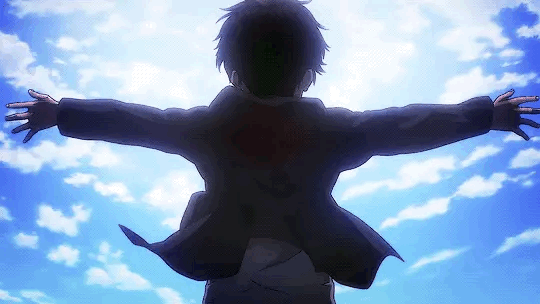
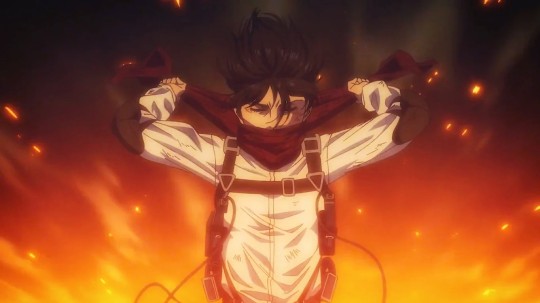
It's so fascintating to me how Armin and Mikasa are like push and pull to Eren; Armin pushing Eren forward to "freedom" with their dream, Mikasa pulling Eren back to the home they lost with her dream
Is Armin then the (albeit unintentional) "bad" influence within the framework of the story, as the "freedom" Eren sought in Armin's eyes resulted in the annihilation of 80% of humanity? And Mikasa the "good" influence, trying to pull him back to the good times they lost? But there's only pain there, because Eren cannot be content in that life...
#cl thoughts#idk bro I don't have a conclusion#ema#and it's not like those times were “good” either - they were still trapped within the walls in an outer district#and eren wasn't content then either#eren jaeger#armin arlert#mikasa ackerman#attack on titan analysis#mikasa#armin#eren yeager#eremin#erearu#eremika#attack on titan#shingeki no kyojin#aot#snk#attack on titan the final season#themes#aot screencaps#aot gifs
95 notes
·
View notes
Text
Just saw the most HORRIBLY inaccurate dissection of Zeke’s character and absolutely had to weigh in to defend my favorite monstrosity monkey. AoT SPOILERS AHEAD.
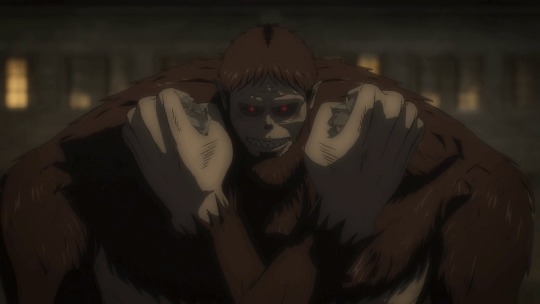
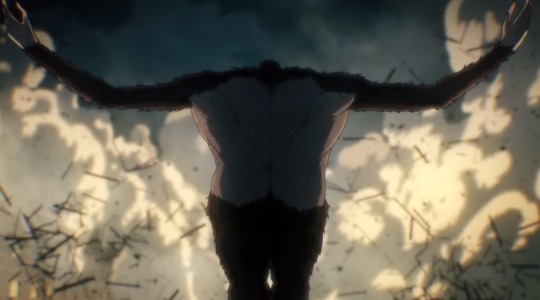
(Pictured above: me coming to explain my favorite fictional character.)
SO, let’s start with Zeke’s backstory, which seems to be a point of some contention. The post in question accused Zeke of fabricating the narrative of being a victim and callously killing his parents. There are many reasons this ISN’T the case.
For one, Zeke was a child, both a member of a marginalized group in an oppressed society and the victim of an abusive household. Perhaps not traditionally, physically, abusive. But Grisha and Dina forced this child to join the MILITARY. Not only that, they hoped he would become a Warrior (which means becoming a Titan and REDUCING HIS LIFESPAN TO A MEASLY THIRTEEN YEARS) all in the hopes of reclaiming the Founding Titan.
They attempted to quite literally sacrifice the life of their only child for a mission, forcing him into a role he didn’t ask for, pressuring him with the FATE OF THE WORLD. OF ALL ELDIANS. You cannot tell me this wouldn’t affect a child.
This person also claimed Zeke never asked Grisha to play catch, but got mad when he didn’t. The only reason this is even technically “correct” is because the one time he tried to ask, Grisha interrupted him so he could spend more time devoting himself to his righteous mission.
What’s more, it wasn’t even Zeke’s idea to give up his restorationist parents to Marley. By the time Zeke tells on them, they had ALREADY been found out — he overheard a Marleyan confirm as much during his warrior training. He went to Mr. Ksaver, the closest thing he had to a parent, to say goodbye — to meet his fate and become a Titan with the rest of his family as punishment. He was going to die.
The ONLY way he could’ve saved himself and his grandparents was to give up his mom and dad. He never wanted to do it. And even if you wouldn’t do the same in this situation, you have to understand the monumental weight of the choices thrust upon him. The lives of his family and people he cared about, even those that mistreated him. A mere child was expected to make such a gut-wrenchingly horrible choice.
Now, for his motivations. Zeke, who has persecuted and abused his entire life for being Eldian, chooses to outwit the Marleyan government, befriend the Founding Titan and, with his royal blood, prevent Eldians from reproducing.
It sounds horrible. It is. And though it sounds contrarian, I think it’s purely the most empathetic course of action from his point of view. He knows better than anyone the persecution the Eldians face, the hate and superstition the rest of the world feels that would simply be impossible to overcome. He cannot change the world’s hateful perception of his people. So he chooses the greatest mercy he can think of. He will peacefully eradicate the Eldians and the power of the Titans, not through bloodshed, but by allowing the final generations to live out their lives in peace. It would also spare them persecution and the world the threat of the Titans.
Now, obviously, his plan is still pretty despicable. His worldview is twisted, to the point where he considers killing to be a mercy — that it would be better for no one to have ever been born. And though he tries to resolve the Eldian problem as peacefully as possible, he still kills thousands of people, if not dozens of thousands. There’s no arguing that he’s a just and moral person — it’s part of the reason he’s the antagonist — but consider the alternatives.
Eren’s plan is genocide. Instead of allowing the persecuted minority to die out, Eren chose to kill billions of people — to try to kill the VAST majority of the world’s population. And though the Marleyan government is pure evil, most of these victims are innocent. Completely undeserving of the cruel fate they would face. As horrible as Zeke’s plan and methods are, it’s hard to say that Eren’s is any better. If anything, the sheer number of people killed makes it even more appalling to me. After all, Eren becomes an antagonist, too. They are both flawed, traumatized men with the weight of the world on their shoulders and unimaginable power in their hands.
The most reasonable plan, of course, is Armin’s. To unleash a small-scale version of the rumbling and destroy Marley’s fleets in order to buy Paradis the time needed to negotiate. But his plan, too, has one huge flaw.
The Founding Titan needs royal blood to be unlocked — something only Zeke and Historia possess. And by Season 4, Zeke has less than a year left to live, and Eren only has about four. It’s not enough time to negotiate, to change the world’s hateful perception of the Eldians. And this time pressure is exactly what pushes Zeke and Eren to take such drastic measures.
Eren would never allow Historia to become a Titan. He wouldn’t stand to see her used and controlled the way her father manipulated her, nor would he allow his friends to live their lives struggling to survive against an ignorant world. His obsession with freedom was too much. It practically controlled him — it, or the will of the Attack Titan. He had to ally himself with Zeke. To him, there was no other choice.
As I said, Zeke knows better than anyone the pain and persecution that comes with being Eldian in this world. He could have passed his blood and Titan to another, but that would bring its own kind of pain, one he knew intimately. He knew what it was like to have a role forced upon him as a child, to be controlled and used and sacrificed for his father’s ambitions. Why would he ever inflict that pain upon someone else? To him, there was no other choice.
We may never know who was right — or if anyone was — and I can’t blame anyone for despising Zeke after all the killing he’s done. But it’s also why he realizes he’s wrong and sacrifices himself to stop the rumbling. He realizes life is beautiful even in the small moments, and that despite the pain, whether someone dies is not his choice to make. Once again, he gives his life for a goal. But this time, it’s not the lesser of two evils or even a misguided man’s vision of mercy. It’s pure selflessness. After a long, miserable life, he has finally realized the beauty in the world — and willingly, he gives it all away.
Zeke Yeager. The wonderboy.
#attack on titan#attack titan#shingeki no kyoujin eren#shingeki no kyoujin#shingeki no kyojin#snk the final season#snk eren#snk fandom#snk#aot the final season#aot anime#aot#eren aot#eren yeager#eren jaeger#zeke jaeger#zeke yeager#aot zeke#beast titan#founding titan#the rumbling#grisha jaeger#grisha yeager#analysis#character analysis
52 notes
·
View notes